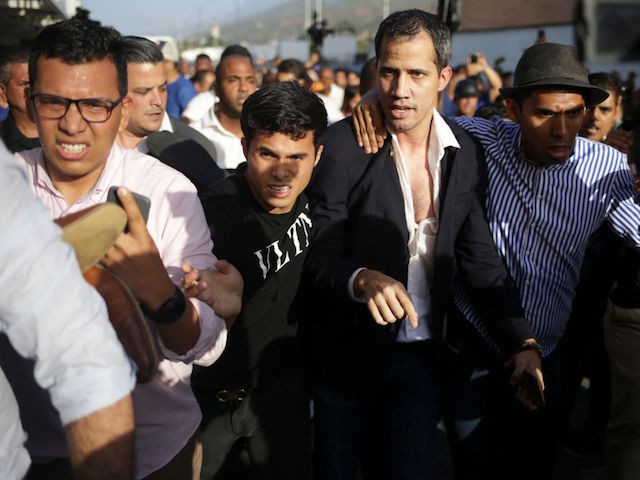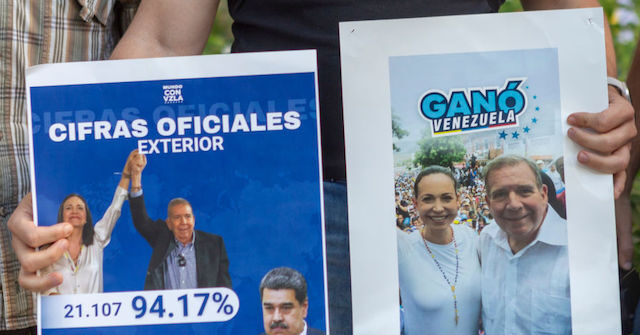Venezuela’s socialist regime and the Venezuelan opposition will each hold presidential inauguration ceremonies in Caracas on January 10, 2025 for the two men they claim are both president: longtime dictator Nicolás Maduro and opposition candidate Edmundo González.
The ruling socialists are slated to once again inaugurate Maduro, while the opposition is planning a ceremony for González, an exiled 75-year-old diplomat who claims he will return to Venezuela and assume the presidency in January.
Venezuela’s decades-long political crisis endured a new complicated chapter in 2024 following the fraudulent July 28 presidential election. On that day, Maduro — who appeared 13 times on the ballot — ran against several handpicked “rivals” and González, the only opposition candidate that the socialist regime allowed to participate. The opposition’s main candidate, María Corina Machado, was not allowed to participate as punishment for calling for international human rights sanctions against the Maduro regime.
The sham election was the result of Maduro trashing an agreement signed in Barbados with the opposition in late 2023 that called for a “free and fair” election to be held sometime during the second half of 2024. The document, known as the “Barbados Agreements,” was signed by both sides under the observation of the administration of outgoing U.S. President Joe Biden and Secretary of State Antony Blinken.
The election concluded with Maduro proclaiming himself the “winner” — yet neither Maduro nor any regime institution has published voter data or documentation that can demonstrate the claimed results at press time. The opposition immediately contested the results and presented thousands of nationwide voter tallies obtained on the day of the election at the local level that they claimed could prove González defeated Maduro in a landslide. The opposition published digital copies of the tallies on a website. The published tallies remain the only available public record of the election’s results.
Several countries such as the United States, Argentina, and the European Union recognized González as the winner of the election, while Maduro’s claimed victory was instead recognized by leftist-led nations and key ideological allies such as China, Russia, and Cuba.
Throughout 2024, Maduro and his socialist regime carried out a relentless persecution campaign of dissidents that dramatically intensified in the aftermath of the sham election after Venezuelans took to the streets to protest the dictator’s claimed “victory.”
A supporter of President Nicolas Maduro holds a dummy of the character known as “Super Bigote,” which represents Maduro, as she takes part in a march to defend the Law against Fascism, Neofascism and Similar Expressions in Caracas on August 23, 2024. (Pedro Rances Mattey / AFP) (Photo by PEDRO RANCES MATTEY/AFP via Getty Images)
United Nations experts estimate that the post-election crackdown left 27 dead and more than 2,400 detained — including over 120 minors, many of whom were subject to torture, beatings, and charged with “terrorism.” The Maduro regime ultimately released the unjustly detained minors towards the end of December. Local non-government organizations estimate that some 1,800 adults are still unjustly imprisoned as of the end of 2024.
González himself was the target of the persecution campaign and fled to Spain in September after the Maduro regime issued an arrest warrant against him. González has publicly insisted that he will return to Venezuela to be sworn in as president in January.
“I am willing to assume the mandate that the Venezuelan sovereign gave me at the polls,” González reportedly told Colombia’s W Radio in November after he was asked how he plans to circumvent the arrest warrant.
Dictator Nicolás Maduro, on the other hand, reiterated in December that he will assume his “mandate” for the next six years and ordered his sympathizers to fill the avenues of Venezuela’s main cities “by the millions” in celebration of the dictator’s “great victory” and to “swear allegiance to Venezuela, to independence and to the Bolivarian homeland.”
Maduro also claimed that González, who he accused of being a “puppet of the oligarchy and [U.S.] imperialism” will never occupy the presidency.
The upcoming separate swearings-in of González and Maduro echo the events that followed Venezuela’s sham 2018 presidential election, in which Maduro also banned opposition candidates and ran against handpicked “rivals.”
The illegitimacy of the 2018 election prompted the Venezuelan National Assembly, at the time controlled by an opposition majority, to act upon what the Venezuelan constitution describes as a “rupture in the democratic order” and appoint Juan Guaidó, who at the time was the head of the parliament, as interim president in January 2019 until the matter was resolved.

Venezuelan interim President Juan Guaidó is escorted to his car after socialists assault him at Simon Bolivar International Airport in Maiquetia, Vargas state, Venezuela on February 11, 2020. (CRISTIAN HERNANDEZ/AFP via Getty Images)
Guaidó, much like González, received the recognition of the United States and much of the free world, while Maduro was recognized by the regime’s allies at the time.
The interim presidency was established with the clear goal of working towards ending Maduro’s usurpation of the presidency, organizing a transitional government, and scheduling free elections in Venezuela. Ultimately, Guaidó’s presidency never exercised any kind of power in the country, and remained as a symbolic figure at best.
Guaidó’s presidency was dissolved at the end of 2022 after it failed to fulfil any of its goals. After traveling to Colombia in 2023, Guaidó was deported to Miami, and has lived in the United States with his family ever since.
Christian K. Caruzo is a Venezuelan writer and documents life under socialism. You can follow him on Twitter here.
Read the full article here
